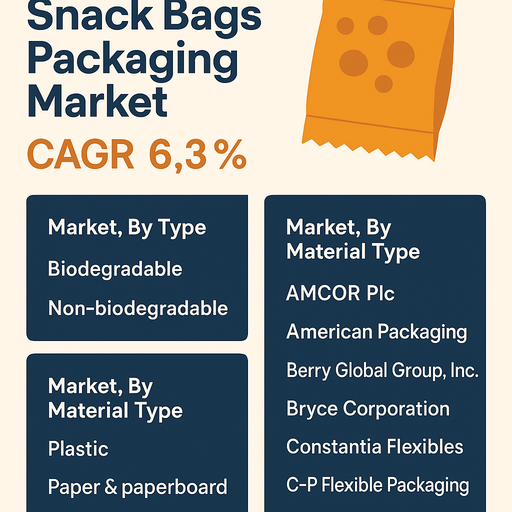The global multi-serving snack bags packaging market is projected to grow at a CAGR of 6.3% during the forecast period of 2025 to 2033. This growth is driven by rising demand for convenient and portioned snack consumption, particularly in urban households and among health-conscious consumers. As consumers shift toward sustainable, resealable, and durable packaging formats for chips, nuts, dried fruits, crackers, and other snacks, manufacturers are responding with innovation in materials, functionality, and branding. The evolution of snack consumption habits, combined with growing preference for family packs or bulk-buy formats, is sustaining demand for multi-serving snack packaging across regions.

Market Drivers
Consumer Preference for Convenient and Cost-Effective Packaging
Busy lifestyles and increased snacking frequency have led to higher consumption of multi-serving snacks, both at home and on-the-go. These packages offer better value-for-money compared to single-serve formats and are increasingly favored by families, offices, and institutional buyers. The ability to reseal, store, and consume over multiple occasions has made this packaging segment an essential element of the modern snacking culture. Furthermore, branding space on larger packs offers food companies better visibility on retail shelves.
Sustainability Trends Fueling Innovation in Material Use
Growing environmental awareness and regulatory push for eco-friendly packaging are accelerating the shift toward recyclable, biodegradable, and compostable materials. Major snack producers are partnering with packaging suppliers to reduce plastic content, integrate post-consumer recycled (PCR) materials, and develop biodegradable laminates. The use of paper-based multi-layer materials is gaining traction for dry snacks. Manufacturers offering certified sustainable solutions are more likely to attract food brands committed to ESG goals and regulatory compliance.
Market Restraint
Material Performance and Cost Challenges in Biodegradable Packaging
While demand for sustainable snack packaging is high, biodegradable and recyclable materials often lag behind conventional plastics in terms of shelf-life, barrier performance (against oxygen and moisture), and cost-effectiveness. This limits their widespread adoption, especially in price-sensitive markets or moisture-sensitive snack categories. Additionally, lack of composting infrastructure and recycling stream confusion among consumers hinder proper disposal, undermining sustainability claims.
Market Segmentation by Type
The market is segmented into Biodegradable and Non-biodegradable packaging. In 2024, non-biodegradable types, particularly multi-layer plastic pouches with metalized films, held a dominant share due to their moisture barrier properties, durability, and printability. However, biodegradable packaging is expected to grow at a faster CAGR from 2025 to 2033 as food companies seek to reduce their carbon footprint. Compostable bioplastics and paperboard-based alternatives are being trialed for dry and semi-moist snack applications.
Market Segmentation by Material Type
By material type, the market is divided into Plastic and Paper & Paperboard. Plastic-based snack bags (e.g., PE, PP, PET) accounted for the largest share in 2024 due to their cost, flexibility, and shelf-life preservation features. However, paper & paperboard are gaining share due to recyclability, consumer appeal, and regulatory pressure on single-use plastics. Laminated paper bags with water-based coatings are increasingly used for bakery snacks and organic food brands.
Geographic Trends
North America and Europe dominated the market in 2024 due to established snacking cultures, demand for resealable packaging, and emphasis on sustainable packaging practices. The U.S., Germany, and the UK are key countries promoting recyclable content in packaging. Asia Pacific is anticipated to witness the highest CAGR during 2025–2033 due to rising disposable incomes, rapid urbanization, and a surge in local snack manufacturing in countries like India, China, and Indonesia. Latin America and the Middle East & Africa are also witnessing increased adoption as modern retail expands.
Competitive Trends
The market is moderately consolidated with major players focusing on R&D and strategic partnerships to expand eco-friendly portfolios. AMCOR Plc, Berry Global Group, and Constantia Flexibles lead in high-performance multilayer plastic films with resealable features. C-P Flexible Packaging and Eagle Flexible Packaging specialize in custom printed, value-added formats for mid-tier brands. American Packaging and Bryce Corporation are investing in compostable materials and digital printing solutions to meet demand from small and premium snack manufacturers. Competitive priorities include barrier innovations, seal integrity, digital printing, and recyclable laminates for long shelf-life products.
Historical & Forecast Period
This study report represents analysis of each segment from 2023 to 2033 considering 2024 as the base year. Compounded Annual Growth Rate (CAGR) for each of the respective segments estimated for the forecast period of 2025 to 2033.
The current report comprises of quantitative market estimations for each micro market for every geographical region and qualitative market analysis such as micro and macro environment analysis, market trends, competitive intelligence, segment analysis, porters five force model, top winning strategies, top investment markets, emerging trends and technological analysis, case studies, strategic conclusions and recommendations and other key market insights.
Research Methodology
The complete research study was conducted in three phases, namely: secondary research, primary research, and expert panel review. key data point that enables the estimation of Multi Serving Snack Bags Packaging market are as follows:
Market forecast was performed through proprietary software that analyzes various qualitative and quantitative factors. Growth rate and CAGR were estimated through intensive secondary and primary research. Data triangulation across various data points provides accuracy across various analyzed market segments in the report. Application of both top down and bottom-up approach for validation of market estimation assures logical, methodical and mathematical consistency of the quantitative data.
| ATTRIBUTE | DETAILS |
|---|---|
| Research Period | 2023-2033 |
| Base Year | 2024 |
| Forecast Period | 2025-2033 |
| Historical Year | 2023 |
| Unit | USD Million |
| Segmentation | |
Type
| |
Material Type
| |
Size
| |
Application
| |
|
Region Segment (2023-2033; US$ Million)
|
Key questions answered in this report